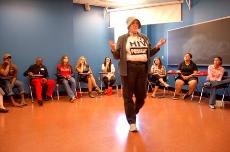Last weekend marked the fourth annual AIDS Awareness Summit hosted by Guilford, an event infused with speakers and events geared to bring awareness to Guilford’s campus. “In your intimate relationships are you being safe?” said Visiting Assistant Professor of Sociology and Anthropology Martha Lang, who was the event’s keynote speaker. “If you are not being safe you can change your unsafe behavior.”
Lang felt the question was important to ask in light of the “condom shmondom” attitude embraced by many college students about protecting themselves during sexual intercourse.
The summit was organized by rising seniors Alethea Leventhal and Cordelia McKusick and Diamond D. Zephir, a rising junior. “This year’s event was exactly what CAAP had wanted it to be,” said Zephir, “It was an experience that had people questioning what they can do in their environment.”
Pacing the floor in Bryan Jr. auditorium, Lang wore a white shirt that read, “HIV Positive” as the audience listened to her point out HIV/AIDS-related issues that currently burden the surrounding Greensboro community. “There are serious structural issues in North Carolina that contribute to the spread of HIV,” said Lang.
Lang said that issues lending themselves to the spread and lack of prevention of HIV came in part from the lack of adequate housing for those who are HIV-positive and indigent as well as the cutbacks of funding for those already infected but who cannot afford to purchase necessary medications.
According to Lang, it is cheaper to house the homeless infected with the HIV virus in efficiency apartments than it is to house them in a shelter. “Right now the only answer to those who have HIV/AIDS is a homeless shelter,” said Lang. “Other states provide clean housing to those who are HIV-positive, and it’s a lot cheaper than putting them in shelters where diseases seem to flourish.”
Following the keynote speech, Amanda Pressley taught a sex education workshop, and then Thomas Clodfelter and Mark Cassity spoke about their experience with HIV/AIDS. Thomas contracted HIV from a girlfriend before being imprisoned and has lived with the disease for 20 years. Cassity founded the AIDS community resource center Higher Ground, located in Greensboro.
Thomas spoke of the horrors of languishing in prison without proper care for his disease and the importance of being aware of the effects of contracting AIDS.
“Being able to hear Thomas’ story of going to jail with full blown AIDS without medical treatment is enough to make anyone listen,” said McKusick.
McKusick said the original stigma of AIDS uses to be, “the virus was seen only in IV drug users, prostitutes, Haitians, and gay men. It was a disease that quickly killed its carriers’ life. It was a disease only found in those who were already socially and politically oppressed, and struggling in a lower class stigmatized lifestyles.”
McKusick pointed out how much the racism, classism, genderism, able-ism, and sexual orientation-ism connected to getting a blood virus makes you rethink what we know of HIV/AIDS.
“The epidemic of HIV/AIDS can be applied to all observations of oppression,” said McKusick.”It’s a scientific blood disease that turned political, simply because of the people who primarily were getting infected. To be able to learn about this epidemic opens your eyes to not only the issue of HIV/AIDS, but the issue of racism, gender bias, classism, and the political destruction when pursuing and encouraging only a few accepted social norms.”
Leventhal, McKusick and Zephir agreed that attendees of the summit were able to experience the various biases and realized their effects here in Greensboro.
McKusick said CAAP was doing all they could to bring awareness to the Guilford campus but they were a long way from garnering their fellow students’ cooperation in helping create a safe sex culture on campus. “Considering the hook-up culture at Guilford, the campus CAAP does the best we can in supplying people with condoms and sufficient lubricant. Nevertheless, it continues to be a difficult issue to get students to advocate for.”
McKusick feels Guilford doesn’t have its act together concerning safer sex in our community.
Lang said AIDS doesn’t care about a person’s age, gender, or social standing. “HIV has been a part of every tissue of me since 1988 – I can’t continue going to war with myself or HIV/AIDS. I’ve made peace with the virus; the fight is around society’s attitude toward people who have the virus.

